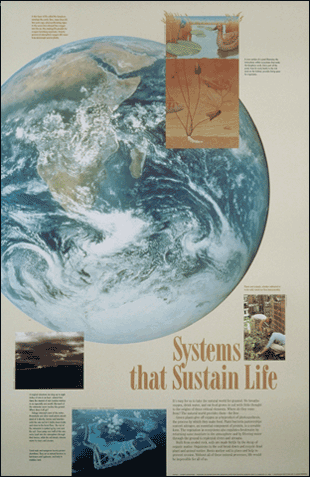 |

|


It' seasy for us to take the natural world for granted.
We breathe oxygen, drink water, and eat food grown in soil with little
thought to the origins of these critical elements. Where do they come
from? The natural world provides them-for free.
Green plants give off oxygen as a byproduct of photosynthesis, the process
by which they make food. Plant/bacteria partnerships convert nitrogen,
an essential component of protein, to a useable form. The vegetation in
ecosystems also regulates freshwater by
returning some moisture to the atmoshere and by filtering water through
the ground to replenish rivers and streams.
Built from eroded rock, soils are made fertile by the decay of organic
matter. Organisms in the soil break down and recycle dead plant and animal
matter. Roots anchor soil in place and help to prevent erosion. Without
all of these natural processes, life would be impossible for all of us.
|
| |

Encyclopedia of the Biosphere
*R-SIBL GF75 .B5613
Encyclopedia of Climate and Weather
*R-SIBL QC854.E523 1996

Computer Indexes
General Science Abstracts
Biology Digest
Environmental Knowledgebase
Earthscape
Print Indexes
General Science Index*R-SIBL
Z7401 .G46
Biological Abstracts*R-SIBL QH301 .B37
Environment Abstracts*R-SIBL GF1 .E553
|

Biomass Burning and its Inter-relationships with the
Climate System
by Michel M. Verstraete
JSE 00-1100
Gaia in Action: science of the living earth ed.
by Peter Bunyard
JSE 96-1026
Climate Change and the Global Harvest: potential impacts
of the greenhouse effect on agriculture
by Cynthia Rosensweig
JBE 99-1737
Cycles of Life: civilization and the biosphere
by Vaclav Smil
JSE 97-251
The Biosphere and Noosphere Reader ed. by Paul
R. Samson
JSF 99-542

|